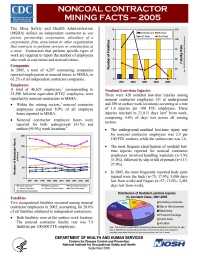Mining Publication: Noncoal Contractor Mining Facts - 2005
Original creation date: September 2008
The Mine Safety and Health Administration (MSHA) defines an independent contractor as any person, partnership, corporation, subsidiary of a corporation, firm, association or other organization that contracts to perform services or construction at a mine. Contractors that perform specific types of work are required to report the number of employees who work at coal mines and noncoal mines. Companies: In 2005, a total of 4,297 contracting companies reported employment at noncoal mines to MSHA, or 63.2% of all independent contractor companies. Employees: A total of 46,623 employees, corresponding to 25,590 full-time equivalent (FTE) employees, were reported by noncoal contractors to MSHA. Within the mining sectors, noncoal contractor employees comprised 8.9% of all employee hours reported to MSHA. Noncoal contractor employee hours were reported for both underground (4.1%) and surface (95.9%) work locations. Fatalities: Two occupational fatalities occurred among noncoal contractor employees in 2005, accounting for 28.6% of all fatalities attributed to independent contractors. Both fatalities were at the surface work location. The noncoal contractor fatality rate was 7.8 fatalities per 100,000 FTE employees. Nonfatal Lost-time Injuries: There were 420 nonfatal lost-time injuries among noncoal contractor employees (31 at underground and 389 at surface work locations) occurring at a rate of 1.6 injuries per 100 FTE employees. These injuries resulted in 21,011 days lost from work, comprising 4.6% of days lost across all mining sectors. The underground nonfatal lost-time injury rate for noncoal contractor employees was 2.9 per 100 FTE workers, while the surface rate was 1.6. The most frequent classification of nonfatal lost-time injuries reported for noncoal contractor employees involved handling materials (n=130; 31.0%), followed by slip or fall of person (n=117; 27.9%). In 2005, the most frequently reported body parts injured were the back (n=75; 17.9%; 3,096 days lost from work) and fingers (n=57; 13.6%; 2,461 days lost from work).
Authors: National Institute for Occupational Safety and Health
Brochure/flyer - September 2008
NIOSHTIC2 Number: 20034779
Pittsburgh, PA: U.S. Department of Health and Human Services, Public Health Service, Centers for Disease Control and Prevention, National Institute for Occupational Safety and Health, DHHS (NIOSH) Publication No. 2008-156, 2008 Sep; :1-2
See Also
- Coal Operator Mining Facts - 2005
- Metal Operator Mining Facts - 2002
- Metal Operator Mining Facts - 2004
- Metal Operator Mining Facts - 2005
- Noncoal Contractor Mining Facts - 2003
- Nonmetal Operator Mining Facts - 2002
- Nonmetal Operator Mining Facts - 2008
- Sand and Gravel Operator Mining Facts - 2006
- Stone Operator Mining Facts - 2003
- Stone Operator Mining Facts - 2005
- Page last reviewed: 9/21/2012
- Page last updated: 9/21/2012
- Content source: National Institute for Occupational Safety and Health, Mining Program


 ShareCompartir
ShareCompartir
